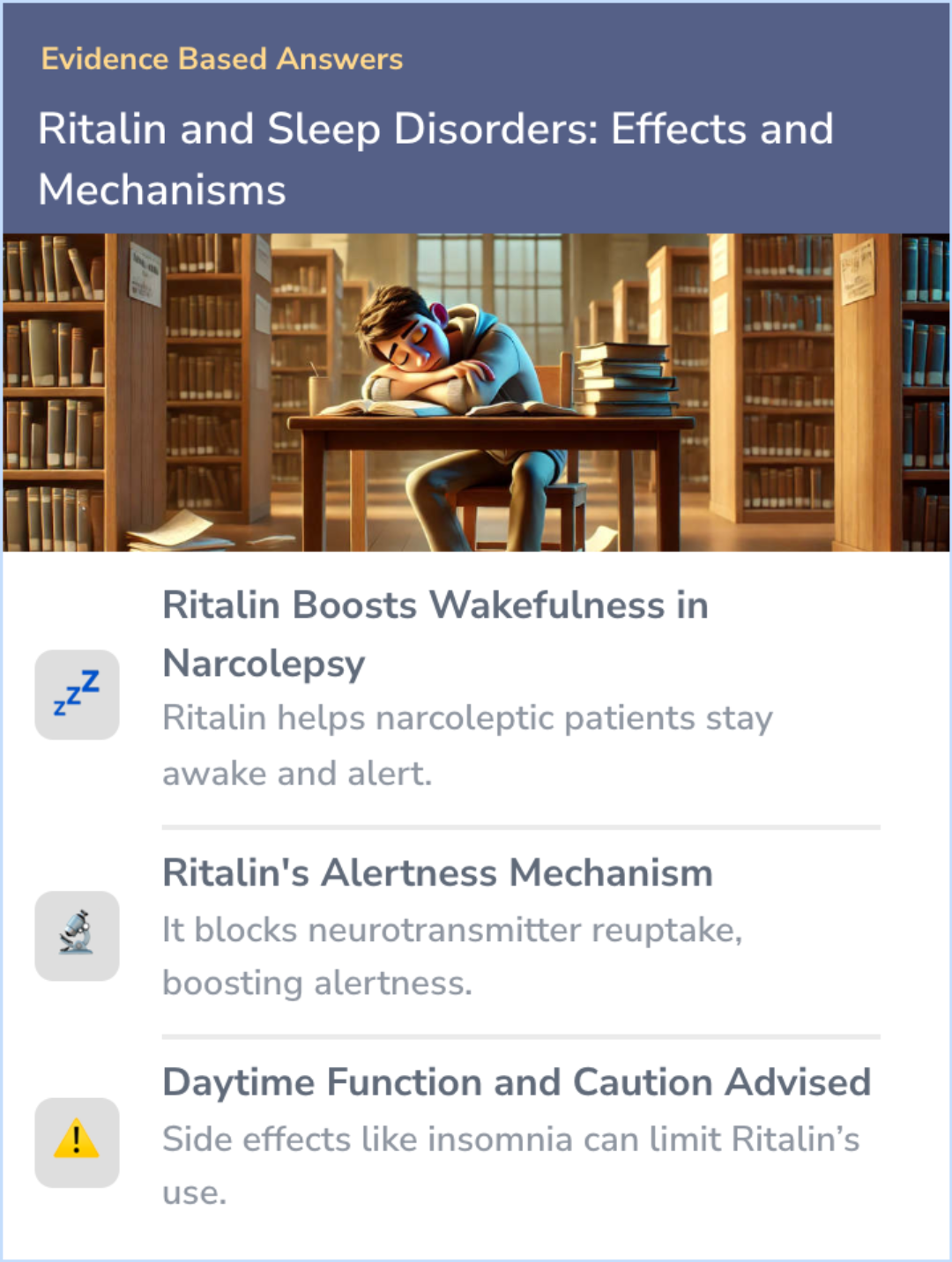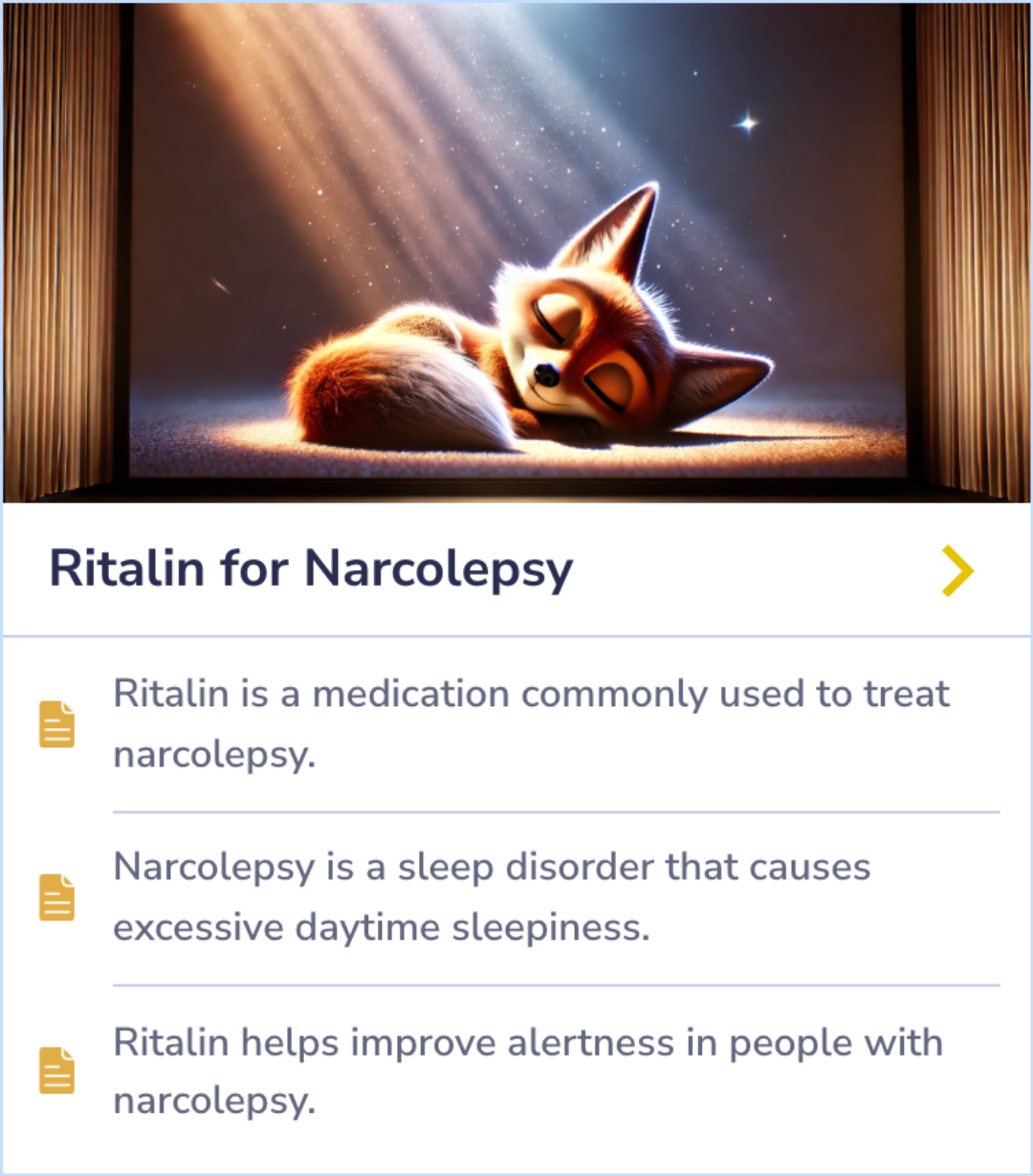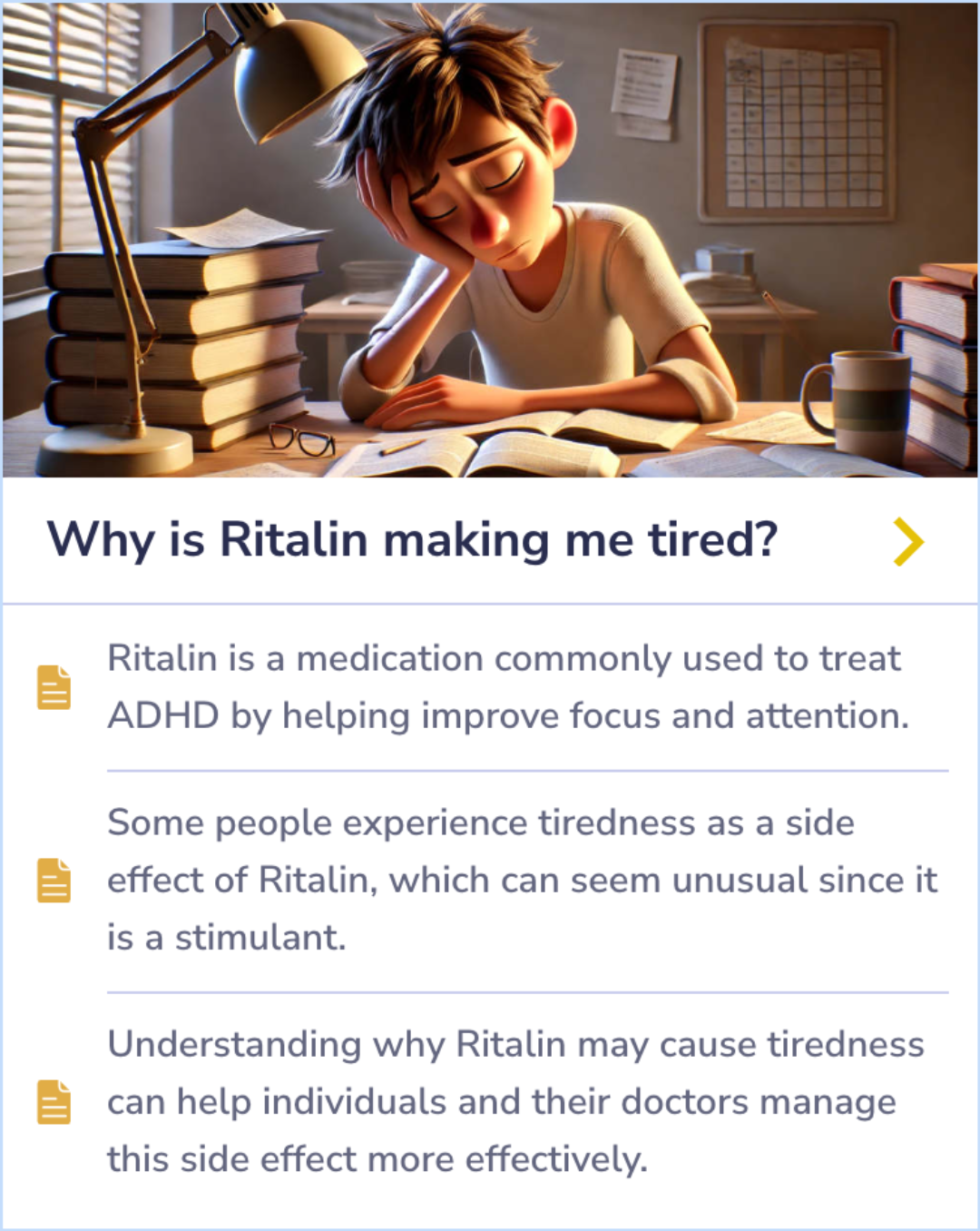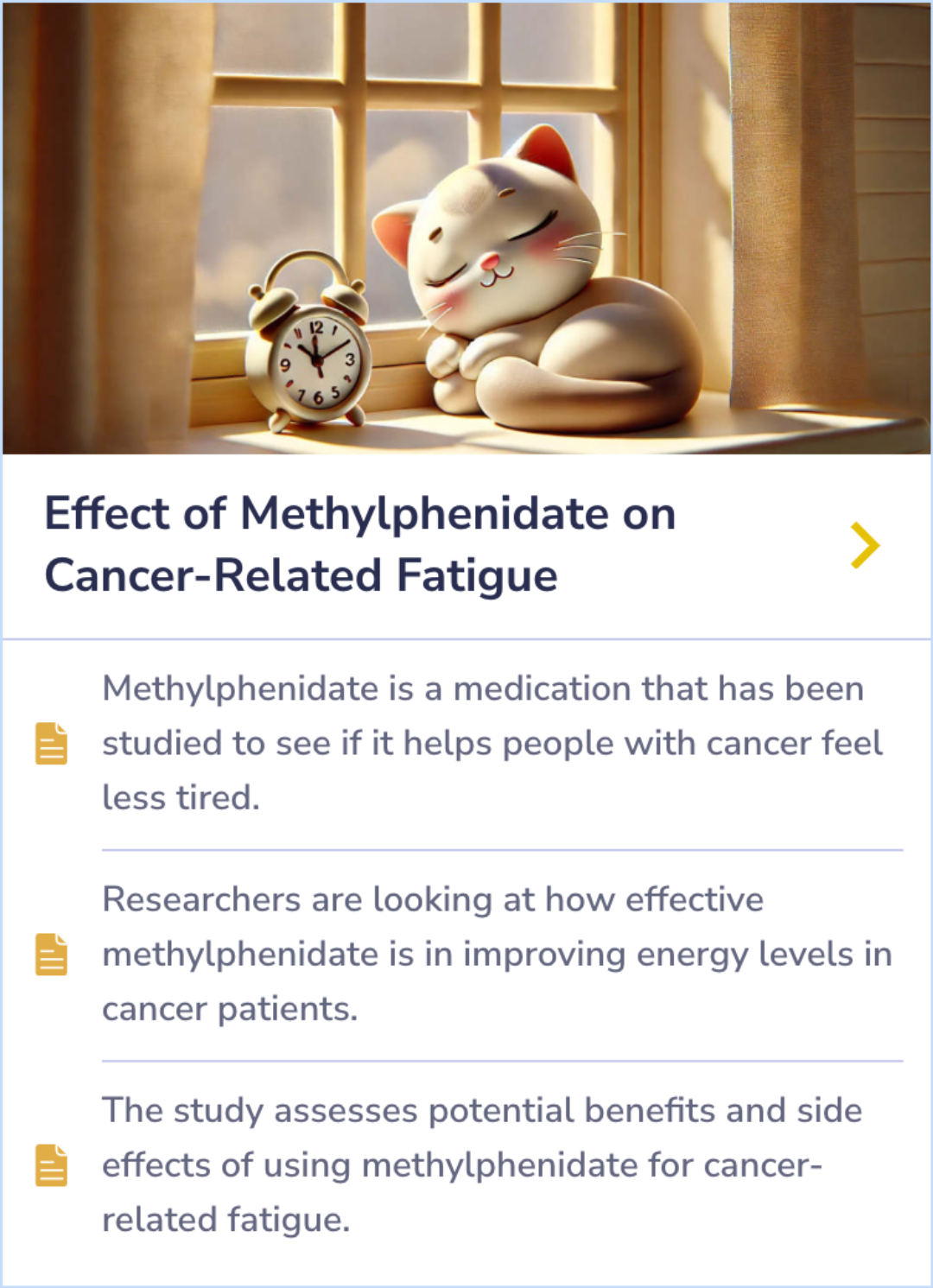Ritalin
Evidence Based Answers
Does Ritalin help with daytime sleepiness?
Ritalin effectively aids wakefulness in people with narcolepsy by blocking neurotransmitter reuptake, like dopamine and norepinephrine. Caution is advised due to potential side effects impacting daily activities, especially at higher doses.
Published: November 8, 2024
Click to explore a section:

Ritalin boosts alertness in narcolepsy, but side effects limit its use.
Background: Indications for Use
Ritalin is prescribed as part of a comprehensive treatment plan addressing conditions like narcolepsy and ADHD. Narcolepsy is a sleep disorder that affects alertness and causes daytime sleepiness. Ritalin aids in managing symptoms by improving focus and controlling impulses.
Treatment typically involves psychological, educational, and social support to achieve a balanced effect. These methods work alongside Ritalin to help improve the overall quality of life for individuals struggling with related daytime sleepiness and alertness issues.
Treatment typically involves psychological, educational, and social support to achieve a balanced effect. These methods work alongside Ritalin to help improve the overall quality of life for individuals struggling with related daytime sleepiness and alertness issues.
Personal Experiences
Perspectives: Ritalin's Varied Impacts on Alertness
In a discussion on using Ritalin for daytime sleepiness and alertness, people shared varying experiences. Some noted improved focus and calmness, while others reported feeling overly hyperactive or experiencing the 'zombie effect,' causing emotional dullness.
For some, the medication led to increased alertness, while others experienced heightened sleepiness, possibly due to underlying sleep issues. Individual responses varied widely, highlighting the personal nature of medication effects.
For some, the medication led to increased alertness, while others experienced heightened sleepiness, possibly due to underlying sleep issues. Individual responses varied widely, highlighting the personal nature of medication effects.
Reddit: u/AdjectiveNoun58
I've been on Ritalin for a month now, and there is no zombie anything going on in my brain. I'm alert, focused, and I don't procrastinate when I'm on it... But everyone is different.Ritalin's Benefits for Narcolepsy
Ritalin has shown benefits in helping individuals with narcolepsy maintain wakefulness and reduce episodes of excessive daytime sleepiness. Clinical trials indicate that patients taking Ritalin experience improved alertness and fewer sleep attacks, with higher doses leading to greater wakefulness.
Ritalin is approved for treating narcolepsy in adults, as its use has been backed by clinical evidence demonstrating its effectiveness in managing symptoms.
Ritalin is approved for treating narcolepsy in adults, as its use has been backed by clinical evidence demonstrating its effectiveness in managing symptoms.
“
Source Quotes:
An early trial of methylphenidate (dose range, 20–60 mg/d) in 106 patients with narcolepsy revealed a dose-related improvement in sleepiness and sleep attacks, as well as a beneficial effect on 'psychic tension.',Later controlled trials confirmed that methylphenidate improved the patient's ability to stay awake and had beneficial subjective effects in narcoleptic patients.
Methylphenidate is FDA-approved for treating attention deficit hyperactivity disorder (ADHD) in children and adults and as a second-line treatment for narcolepsy in adults.
Mechanism of Action for Increased Alertness
Ritalin increases wakefulness primarily by blocking the reuptake of neurotransmitters like dopamine and norepinephrine, which are involved in mood regulation and alertness. By raising their levels in the brain, Ritalin helps reduce daytime sleepiness and improve alertness.
The precise mechanism by which Ritalin promotes wakefulness is still being explored, but its stimulant properties contribute to its popularity in treating narcolepsy and excessive daytime sleepiness.
The precise mechanism by which Ritalin promotes wakefulness is still being explored, but its stimulant properties contribute to its popularity in treating narcolepsy and excessive daytime sleepiness.
“
Source Quotes:
Although the mechanism of action of methyl-phenidate is not completely understood, the drug has long been thought to block the reuptake of dopamine in the brain.
Methylphenidate blocks the reuptake of two neurotransmitters, norepinephrine (NE) and dopamine, in presynaptic neurons.
Impact on Daytime Function and Safety
While Ritalin enhances daytime alertness, it may lead to side effects, especially at higher doses. Common side effects reported include insomnia, anxiety, and irritability, which could limit its long-term use.
Caution is advised for patients using Ritalin, particularly during tasks requiring sustained attention, like driving or operating machinery, until they fully understand how the medication affects their performance.
Caution is advised for patients using Ritalin, particularly during tasks requiring sustained attention, like driving or operating machinery, until they fully understand how the medication affects their performance.
“
Source Quotes:
The most common adverse reactions associated with discontinuation (≥1%) from either pediatric or adult clinical trials were anxiety, irritability, insomnia, and blood pressure increased.,Stimulants may impair the ability of the patient to operate potentially hazardous machinery or vehicles.
Comparing Ritalin and Modafinil
Ritalin is often compared to modafinil, another medication that promotes wakefulness in conditions such as narcolepsy. Both drugs enhance alertness but function through different mechanisms and have unique uses. Modafinil is frequently prescribed for sleep apnea and shift-work disorder, while Ritalin is considered a second-line treatment for narcolepsy.
Recognizing these differences assists in selecting the most suitable treatment based on individual needs and symptoms.
Recognizing these differences assists in selecting the most suitable treatment based on individual needs and symptoms.
“
Source Quotes:
The second, a wakefulness promoting agent licensed for the treatment of excessive daytime sleepiness associated with narcolepsy, sleep apnoea and shift-work sleep disorder.
Methylphenidate is FDA-approved for treating attention deficit hyperactivity disorder (ADHD) in children and adults and as a second-line treatment for narcolepsy in adults.
Key Takeaways
Conclusions
Ritalin offers notable benefits for individuals with narcolepsy by enhancing wakefulness and reducing excessive daytime sleepiness.
It works by increasing levels of key neurotransmitters in the brain. While effective, users should be mindful of potential side effects, especially with long-term usage. Comparisons with other medications like modafinil highlight its unique application based on personal needs.
It works by increasing levels of key neurotransmitters in the brain. While effective, users should be mindful of potential side effects, especially with long-term usage. Comparisons with other medications like modafinil highlight its unique application based on personal needs.

Evidence Summary
Ritalin’s Role in Managing Narcolepsy
Ritalin helps people with narcolepsy manage daytime sleepiness, improving their ability to stay awake and alert. By enhancing focus, it supports those affected by this sleep disorder in staying attentive and more energized throughout the day.
Its primary role in narcolepsy treatment involves counteracting excessive drowsiness, enabling individuals to maintain a steadier level of alertness during daily tasks.
Its primary role in narcolepsy treatment involves counteracting excessive drowsiness, enabling individuals to maintain a steadier level of alertness during daily tasks.
Evidence Summary
Unexpected Tiredness from Ritalin
Ritalin is prescribed to improve focus and attention in individuals with ADHD. Despite being a stimulant, it can lead to unexpected tiredness in some users, a side effect that may seem contradictory to its intended purpose.
While enhancing focus, certain individuals experience fatigue, highlighting the diverse responses to the medication. Exploring this helps patients and healthcare providers navigate daily challenges more effectively.
While enhancing focus, certain individuals experience fatigue, highlighting the diverse responses to the medication. Exploring this helps patients and healthcare providers navigate daily challenges more effectively.
Evidence Summary
Can Methylphenidate Help Cancer Patients Manage Fatigue?
Methylphenidate is explored as a way to help cancer patients cope with persistent fatigue. This medication, often known for its use in treating ADHD, is evaluated here for its potential to enhance energy levels in those dealing with cancer-related tiredness.
Researchers carefully examine both the benefits in reducing fatigue and any side effects that might arise from its use, aiming to determine if it can provide a supportive option for those facing energy depletion due to cancer.
Researchers carefully examine both the benefits in reducing fatigue and any side effects that might arise from its use, aiming to determine if it can provide a supportive option for those facing energy depletion due to cancer.


